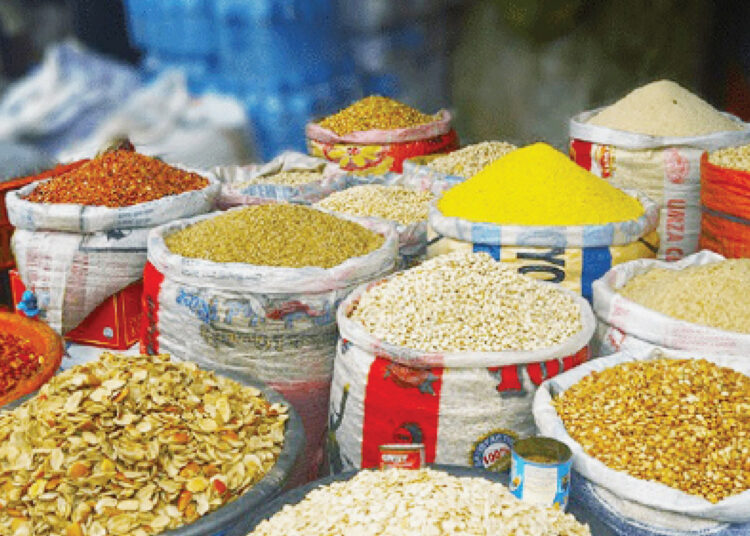The much-touted drop in food prices across the country has yet to make a meaningful impact on most Nigerians.
Some citizens who spoke with LEADERSHIP Weekend admitted that the prices of some of the major food items had witnessed reductions, but they have yet to benefit from this development because they have no money to buy them at the current prices.
They said the primary problem before them was no longer the high prices of goods but the lack of purchasing power.
According to them, they still face severe hunger, going to bed on empty stomachs with members of their families because they lack the resources to buy food at the present rates.
When LEADERSHIP Weekend visited major markets in some urban centres and capitals in some states of the federation, both food retailers and their customers expressed frustration at the toll the economic hardships were taking on them.
Some traders said business was dull because the buyers were not forthcoming, while the middlemen, who buy in bulk, do so on a credit basis.
At Utako Market in the Federal Capital Territory (FCT), Abuja, LEADERSHIP Weekend noticed a reduction in food prices, particularly for essential items like flour, sugar, rice, and pasta.
Raymond Nnamdi, a market trader who sells staple foods such as rice, beans, and garri, said while some items had seen slight price drops, the cuts were inconsistent.
For example, a mudu (local measure) of rice, which was previously sold for N3,500, has dropped to N2,900, while the price of the same measure of beans has reduced from N4,000 to N2,000. However, these prices fluctuate frequently.
“One day, the price of rice drops by a few hundred naira, and the next day, it goes up again,” Nnamdi lamented.
A yam seller, Mrs Racheal Bature, linked the price fluctuations to insecurity in farming regions, particularly in the north. “Farmers are forced to pay passage fees to bandits to access their farmlands, both before planting and at harvest time,” she explained.
At Nyanya Market in Abuja, a buyer, Mr Thompson Ushie, also confirmed minimal price reductions, such as a drop of just N100 in the price of garri, which now sells for N1,500 per mudu. Crayfish remains at N6,500 per mudu, and pepper continues to be expensive, he said.
A civil servant, Mrs Rosemary Attah, voiced her frustration, saying that basic staples such as yam tubers and palm oil are still unaffordable for many.
“We now consider yam a luxury food. Even salt and palm oil are costly,” she said. “The price cuts they announce don’t make a difference for the average person.”
dietary habits, while a few respondents said they could now afford more food items, the majority said they still eat fewer meals daily.
“Three square meals? That’s a luxury for many families,” said Mrs Ada, noting that most Nigerians now rely on one or two meals a day.
An agricultural economist, Dr Paul Agbo, corroborated that food prices were still beyond the reach of most Nigerians.
He said while food prices have dropped in some areas, their affordability remains a major challenge.
“The issue is not just the price but the ability to afford it. Many Nigerians are earning less or are unemployed, so even with a 10 per cent reduction in food prices, they still can’t buy enough to feed their families,” Agbo explained.
In Kano State, the price of a mudu (approximately 2kg) of corn, which was N2,500 last year, is now N1,400 at the Dawanau International Grains Market, while beans measuring the same quantity, which sold for N6,000, is now between N2,700 and N3,500.
Millet and sorghum currently sell for between N1,500 and N1,700, down from N2,500 last year, while wheat currently costs N2,000 for the same measure.
Some residents of Kano told our correspondent that they had not felt the impact of the food price crash.
Mrs Sarah Paul said the crash in food prices had not solved the hunger problem in Nigeria, explaining that, despite the reduction, many Nigerians like her still do not have enough resources to buy food for their families.
According to her, she still finds herself struggling to provide three square meals because of lean resources.
“I don’t eat better because there is no money to buy these food items,” she stated.
Similarly, Mrs Elizabeth Lipdo said it was not all food prices that have crashed, making the effect less significant.
She said, “There are foods which are a necessity in the house that are still on the high side, such as pepper, which is very expensive; onions, even though it’s coming out now since we are in the season; yam and potatoes are still very expensive. Our source of protein, such as beef, chicken, and eggs, are still expensive.
“Anyway, we still thank God and hope that the prices will further go down,” she said.
At the popular Sheikh Gumi Market, known as Kasuwa, in Kaduna State, a 100kg bag of maize, which was sold between N70,000 and N75,000 months ago, is now N47,000, while soybeans, sold for N110,000, is now N70,000.
The white variety of beans, which was sold for N150,000 last year, is now N100,000.
The 50kg bag of rice, which sold for between N100,000 and N120,000, has dropped to between N80,000 and N100,000 at the Central Market.
At the Kasuwa Monday Grains Market, the price of soybeans has reduced from N120,000 to N80,000, and white beans from N120,000 to N88,000.
A retailer, Aisha Muhammad, said, “We are happy that the prices have dropped, but there is no money to buy them.”
Mrs Muhammad said even though the prices of food items had dropped, “we are still finding it difficult to eat three times daily.”
A wholesaler in the same market, Alhaji Sadiq, lamented low patronage, saying that the “people are not buying like a few years ago. Most of my customers, who are retailers, buy on credit and pay back after selling.”
In Benue State, rated as the “Food Basket of the Nation”, the residents said hunger had persisted despite the food price crash and regular salary payment by Governor Hyacinth Alia’s administration.
They attributed the hunger to sustained attacks on the farming communities of the state by marauding herdsmen, where most of the farmers fled and abandoned their farms and barns.
Although some of the low-income earners in Makurdi metropolis, the state capital, who pleaded anonymity, said they were experiencing some relief as food prices continue to decline gradually.
Others said, though Governor Alia had regularised salaries and introduced programmes to force down the price of food items, they were still finding it difficult to have three square meals a day.
Three of Isaac Iduh, Ominyi Egwurube, and Mbafan Wuam said there was a crash in food prices. They, however, appealed to the federal government to ensure that the prices of Premium Motor Spirit (PMS) are also reduced so that transport fares can be affordable.
They decried the situation where farmers were forced to sell their produce below the cost price instead of compelling petroleum product dealers to bring down their prices to ease the movement of goods and services.
“Government should stop playing politics with farmers by impoverishing them after a hard struggle with herders and bandits, where most of them lost their lives and others are living with permanent disabilities, then their consolation is a price crash by the government that is unable to crash the prices of PMS and the naira to the dollar,” they said.
The group managing director of Benue Investment and Property Company (BIPC), Dr Raymond Asemakaha, in one of his outings, explained that the company’s decision to introduce a price floor and also off-take essential farm produce from Benue farmers through its Agro Commodities Initiative (ACI) had forced down prices and protected both consumers and farmers in the state.
A market survey conducted by our correspondent in some major markets in Makurdi metropolis revealed a noticeable drop in the cost of essential food items compared to six months ago.
At Wadata Market, a 50kg bag of local rice sells for between N26,000 and N29,000, down from N45,000 to N55,000 it cost six months ago. Similarly, at Modern Market, the price of a mudu of rice dropped from N2,700 to N1,800.
Other staples have also seen price reductions, as a big basket of tomatoes, previously sold for N45,000, now costs between N35,000 and N30,000. The price of a mudu of maize, millet, and guinea corn has fallen from N3,200 to N1,200.
Additionally, a litre of palm oil now sells for N1,800, down from N2,500, while a custard rubber of garri has dropped from N3,500 to N2,300. Depending on their sizes, the price of 10 tubers of yam now ranges between N10,000 and N9,000, down from the previous N15,000 to N18,000.
Despite the reduction in prices, traders report that patronage remains low due to financial constraints faced by residents.
According to Yusuf, a trader at Wurukum Market, “Before now, I sold a 25kg bag of local rice for N55,000, and customers were coming, but now that it goes for N37,000, sales are still poor.”
For residents of Owerri, the capital of Imo State, the claims of food price crashes are a mirage. They alleged that the only items whose costs were reduced were rice and beans.
Mrs Miriam Njoku, who sells grains at the World Bank Market, said that as of January 2025, a bag of rice sold for N100,000 and above, but from February, the price reduced to N90,000.
Mrs Ogechi Amadi said a basket of tomatoes sells for N58,000, as against N110,000 in December, adding that both dry and fresh pepper still sells for the same price.
Tomato paste and other condiments still sell for the same old price.
Beverages, such as a roll of Milo or Twisco, sell for N1,800 for 10 pieces and have been at that price since last year.
“Beverages such as Milo or Twisco added N100 from last December, such that customers thought it was a rip-off. A roll of Three Crowns small sachete milk is N1,300, and Kremela is N850 or N1,000,” she said.
Other items, like chicken, sell for N12,000 for a sizeable live chicken, rising to N16,000.
Gas sells for N1,400 per kg, and a loaf of bread costs N1,500-N2,000.
Mr Jones Nkemjika said he buys a loaf of bread from the bakeries for between N1,600 and N3,500. The cheapest meat pie is N1,000.
A beef seller said his customers buy lesser quantities for the same amount because the prices of cows keep rising.
Dr Desmond Echeta, an economist and senior lecturer at the Imo State University of Environmental Sciences, said the cost of living was high as people could barely afford basic amenities.
“The situation is serious; people are buying more to pay later. A lot of people collect salaries to repay debts, and this is not good,” he said.











